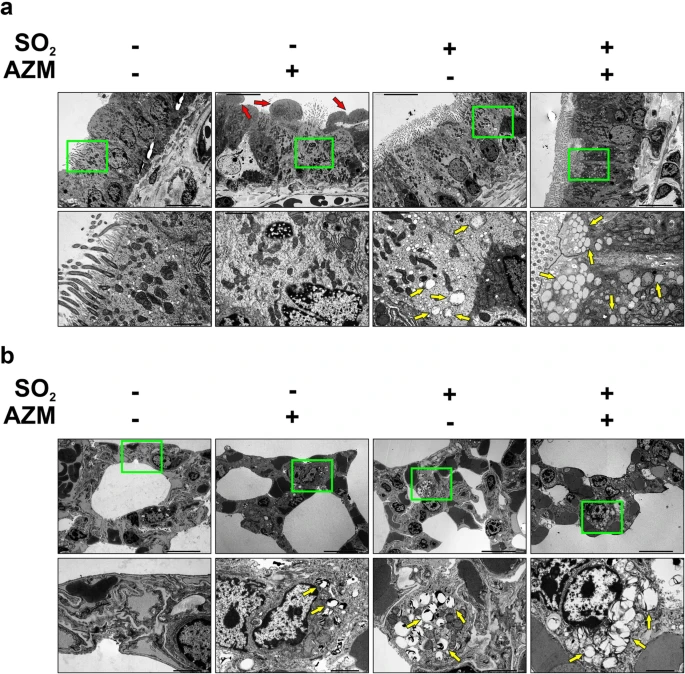- Research
- Open Access
Respiratory Research 21, Article number: 233 (2020)
Background
The airway epithelium (AE) forms the first line of defence against harmful particles and pathogens. Barrier failure of the airway epithelium contributes to exacerbations of a range of lung diseases that are commonly treated with Azithromycin (AZM). In addition to its anti-bacterial function, AZM has immunomodulatory effects which are proposed to contribute to its clinical effectiveness. In vitro studies have shown the AE barrier-enhancing effects of AZM. The aim of this study was to analyze whether AE damage caused by inhalation of sulfur dioxide (SO2) in a murine model could be reduced by pre-treatment with AZM.
Methods
The leakiness of the AE barrier was evaluated after SO2 exposure by measuring levels of human serum albumin (HSA) in bronchoalveolar lavage fluid (BALF). Protein composition in BALF was also assessed and lung tissues were evaluated across treatments using histology and gene expression analysis.
Results
AZM pre-treatment (2 mg/kg p.o. 5 times/week for 2 weeks) resulted in reduced glutathione-S-transferases in BALF of SO2 injured mice compared to control (without AZM treatment). AZM treated mice had increased intracellular vacuolization including lamellar bodies and a reduction in epithelial shedding after injury in addition to a dampened SO2-induced inflammatory response.
Conclusions
Using a mouse model of AE barrier dysfunction we provide evidence for the protective effects of AZM in vivo, possibly through stabilizing the intracellular microenvironment and reducing inflammatory responses. Our data provide insight into the mechanisms contributing to the efficacy of AZM in the treatment of airway diseases.
The airway epithelium (AE) forms the first line of defence against harmful particles and pathogens. Barrier failure of the airway epithelium contributes to exacerbations of a range of lung diseases that are commonly treated with Azithromycin (AZM). In addition to its anti-bacterial function, AZM has immunomodulatory effects which are proposed to contribute to its clinical effectiveness. In vitro studies have shown the AE barrier-enhancing effects of AZM. The aim of this study was to analyze whether AE damage caused by inhalation of sulfur dioxide (SO2) in a murine model could be reduced by pre-treatment with AZM.
Methods
The leakiness of the AE barrier was evaluated after SO2 exposure by measuring levels of human serum albumin (HSA) in bronchoalveolar lavage fluid (BALF). Protein composition in BALF was also assessed and lung tissues were evaluated across treatments using histology and gene expression analysis.
Results
AZM pre-treatment (2 mg/kg p.o. 5 times/week for 2 weeks) resulted in reduced glutathione-S-transferases in BALF of SO2 injured mice compared to control (without AZM treatment). AZM treated mice had increased intracellular vacuolization including lamellar bodies and a reduction in epithelial shedding after injury in addition to a dampened SO2-induced inflammatory response.
Conclusions
Using a mouse model of AE barrier dysfunction we provide evidence for the protective effects of AZM in vivo, possibly through stabilizing the intracellular microenvironment and reducing inflammatory responses. Our data provide insight into the mechanisms contributing to the efficacy of AZM in the treatment of airway diseases.

No comments:
Post a Comment